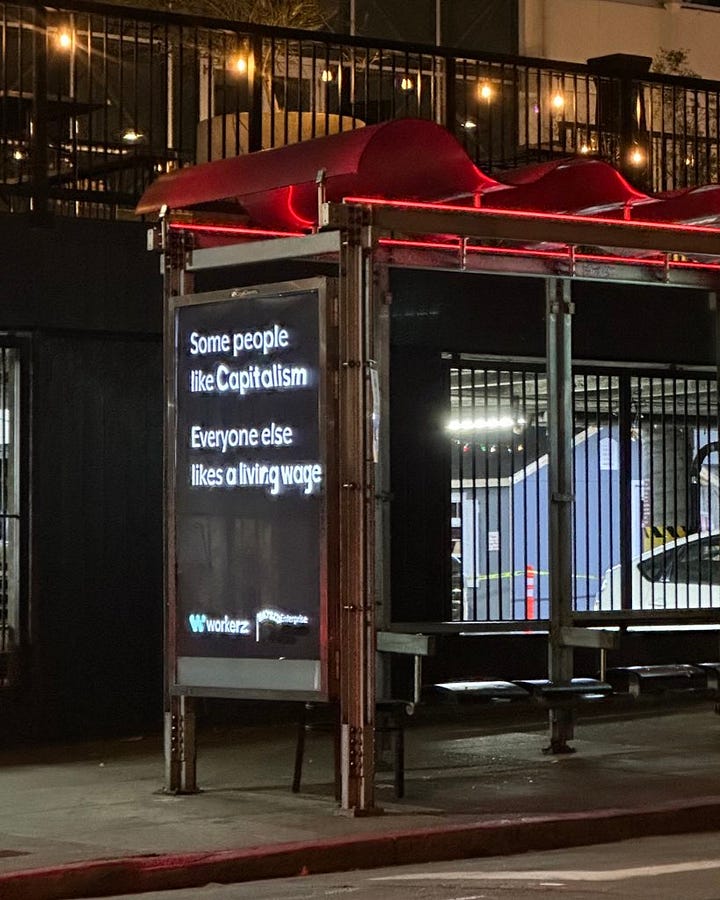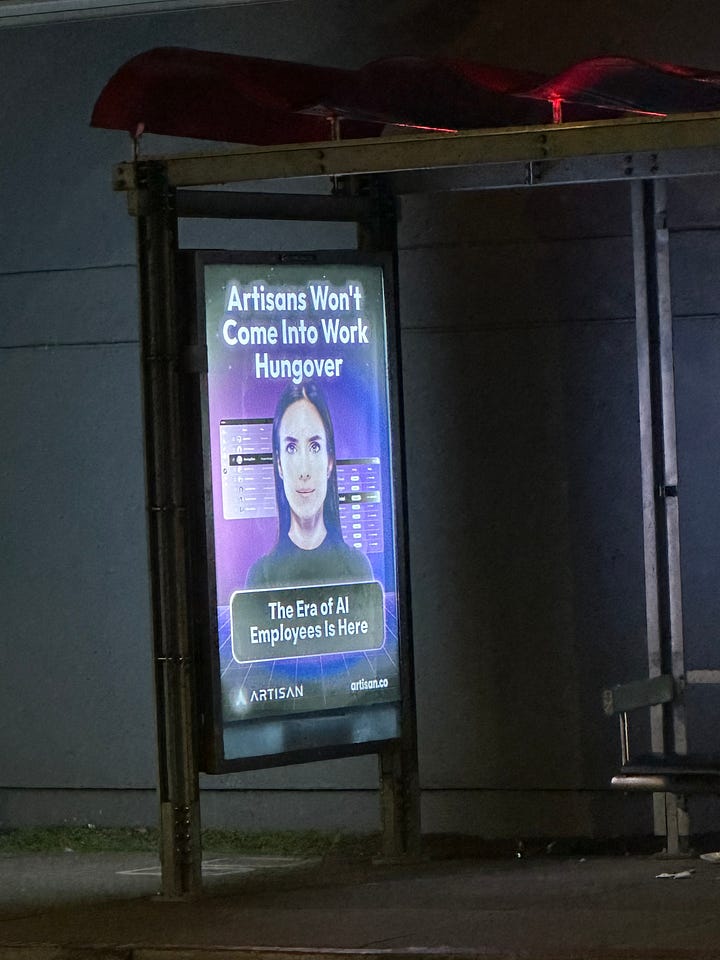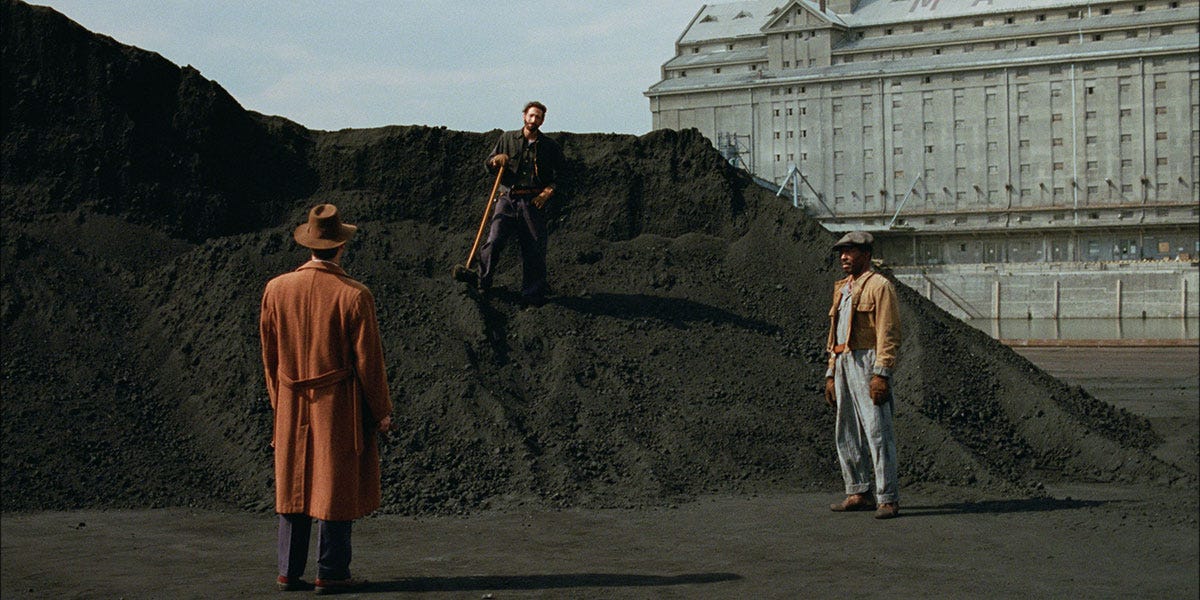🌻 spy mania!
China hawks, The Brutalist, and a request for information
Dear reader,
My first reported and commissioned feature—“Silicon Valley’s new Red Scare”—was just published in Business Insider!1 I investigate how fears of Chinese espionage are spreading across the tech industry, especially in light of the US-China “AI race.”
Reporting it was much more fun than expected. I went from going “How the hell will I write 1,800 words about Twitter drama” to “I could easily write 20,000 more words about the history of McCarthyism, high-skilled immigration reform, and AI nationalism.” I came out of this knowing both more and less than when I began; and realized that there are stories everywhere, no matter how small they seem on the surface.
Working with a professional editor also made me smarter, fairer, and more rigorous.2 It’s fashionable to dunk on the mainstream media right now, but I guarantee that I would’ve made more factual errors and done less research without my editor’s attention to detail. Journalism, like all disciplines, has its share of scandal and embarrassment, but fact-finding retains its value as an ideal to aspire to. There’s a quote from Robert Caro’s memoir Working that has stayed with me:
While I am aware that there is no Truth, no objective truth, no single truth, no truth simple or unsimple, either; no verity, eternal or otherwise; no Truth about anything, there are Facts, objective facts, discernible and verifiable. And the more facts you accumulate, the closer you come to whatever truth there is.
Reporting is the process by which I feel incrementally more qualified to have a take, and I’m eager to do more of it.
Here are the rest of today’s provocations:
Spy mania: Outtakes
The Brutalist and Richard Brody (no spoilers)
A tale of two supervisors
Four story ideas + a request
Spy mania: Outtakes
I’m pretty happy with the final article, but figured I’d use this space to dump some thoughts that were too half-baked or out of scope to publish:
I want to start by being clear that there are probably Chinese spies in Silicon Valley, and Russian spies, and other spies too.3 I don’t think it’s xenophobic to suggest this—these are imperial and authoritarian powers we’re talking about!
But I got to see up close the collateral damage of resorting to vigilante profiling and baseless xenophobia as a solution. First, we should’ve learned from McCarthyism: using social media to accuse random Chinese people of being spies is a shitty thing to do. In particular I’m begging you guys to be normal to Asian women—one of my sources was called a “honeypot” by a dance partner at a bar, and I saw so many tweets suggesting “If a hot Chinese girl is talking to you, she’s probably a spy!” (These gender dynamics require a whole other essay to untangle.)
Second, even if you care exclusively about American AI progress, spy mania is shooting yourself in the foot. The US simply doesn’t have nearly enough home-grown AI talent; other countries (especially China) do. The armchair critics suggesting we should ban foreign nationals from AI labs have… clearly never worked at an AI lab. There are entire teams without a US passport! Nationality-based discrimination is an extremely blunt tool to a highly specific problem, and will throw the baby out with the bathwater. And due to heightened paranoia (and the immigration/visa problems that ensue), many talented Chinese people are already turning down AI jobs, or being forced to return to China. And workers pushed out of the US will end up helping foreign companies, no “tech transfer” required.
~
But why worry now? Increasingly, policymakers are viewing powerful AI as a geopolitical and not only an economic asset.
One catalyst was Leopold Aschenbrenner’s “Situational Awareness” paper (he claimed he was fired from OpenAI for raising concerns about Chinese spies4). Read all 165 pages if you want, but here’s my quick summary:
In June last year, AI researcher Leopold Aschenbrenner said he was fired from OpenAI for sharing concerns about foreign espionage with the OpenAI board. He then published a paper-cum-manifesto titled "Situational Awareness: The Decade Ahead," about the race to AGI, or artificial general intelligence — what he calls the "most powerful weapon mankind has ever created," comparable to nuclear weapons. "If we're lucky, we'll be in an all-out race with the CCP; if we're unlucky, an all-out war," he wrote. In a section called "The Free World Must Prevail," Aschenbrenner paints a dystopian scenario where the Chinese Communist Party steals model weights and algorithms and uses them to target "advanced bioweapons" at "anybody but Han Chinese," "individually assess every citizen for dissent," and "enforce the Party's conception of 'truth.'"
While the report reads like a high school policy debate case (derogatory), it has been indisputably influential—especially in the new administration (“excellent and important,” per Ivanka Trump).
But alarm bells go off when I hear “free world”-type arguments. Too often, leaders have wielded the threat of foreign authoritarianism (e.g. Chinese mass surveillance) to justify reckless expansion of the domestic security state. Mere days into the new Trump administration, we’re seeing Instagram block the hashtag #democrat and Larry Ellison call for AI-enforced behavioral surveillance. And just as the Chinese government silences collective expression on their domestic tech platforms, Musk has proven willing to treat Twitter/X as a state-controlled media apparatus for the right, censoring opposition whenever convenient.
So yes, China deploys techno-authoritarian tactics, but the call is also coming from inside the house. Illiberalism is not more justified when it happens on American soil.
And how much of the China threat is “China envy”? In Silicon Valley, China is known for building fast trains, eliminating urban crime, churning out EVs, and now, building hyper-efficient and performant LLMs for a fraction of the cost and compute. Never mind locking down the labs—DeepSeek is more open than OpenAI’s been in years. There are competitive economic incentives for American companies to play up the threat.
Nevertheless, I expect US tech policy to keep getting more protectionist, and AI companies to bring their strategy in closer lockstep with geopolitical goals. (Herbie Bradley offers more detailed and useful AI policy predictions here.) Just this week, we’ve seen OpenAI’s Stargate project and Scale’s letter to Trump make their case in the language of national defense:
Once I clicked in, many of Scale’s proposals actually seem reasonable and good—I’m a big fan of publicly funded open data, for example. They don’t have much to do with wartime at all. What’s notable, rather, is how the political climate requires tech leaders to wield the threat of World War 3 in order to get anything done.5
~
While my reporting focused on Silicon Valley, it seems like the foreign policy community is operating in a similar environment. There’s an interesting new study from Michael Cerny and Rory Truex on “hawkflation.” Quoting from the abstract:
Roughly one fourth of survey respondents noted instances of professional pressure to voice a more hawkish point of view towards China, and many feared being perceived as naive or compromised by their views on, ties to, and experiences in China. These pressures were particularly noteworthy for foreign policy professionals that are traditionally marginalized from power—those who are younger, non-white, or female.
Furthermore, Cerny and Truex found that respondents’ actual perspectives on a range of China-related policy issues are actually quite varied. Most respondents were open to bilateral cooperation on shared issues, the group split over whether China presents a “whole-of-society threat” to the US, and over 90% thought the US president should not declare a “new Cold War.”
Their results are reassuring and also not. Given the deadly stakes of a US-China conflict or AI arms race, the militant groupthink permeating tech and politics seems quite dangerous to me!6
The Brutalist and Richard Brody
I adhere to strict procedure when I visit an art exhibit. First, I look at the artwork. If it grabs me, I allow myself to read the little panel description on the wall. Then, I look at the art again. The first viewing aims to capture an emotional impression; only on the latter, do I allow myself to think through the work as a crafted thing.
Crucially, this little routine prevents the explanatory text from standing in place of the work—which can never be captured in a ChatGPT-quality chunk of art school buzzwords and look-at-me references—text which inevitably makes the experience worse by collapsing the kaleidoscope of possible interpretations into a single very boring one.
I’ve always wished to see movies this way too—I don’t watch trailers, for instance—but until recently, didn’t have time to see them twice. Finally freed from the 9-5, I recently got to do this with The Brutalist (2024): I saw it last Friday with zero context; then over the weekend, shotgunned director interviews, architect takes, and Substack haterade; and finally sat through another 3.5 hour showing on Tuesday night.
While I don’t profess good taste in film, I loved The Brutalist on both screenings. For starters, Adrien Brody kills in every fit. The soundtrack was excellent. I’m a sucker for plots about creative ambition (Whiplash, Tar, etc); I loved how felt precarity was conveyed in topsy-turvy shots and vertical camera pans that stop just before showing viewers what they want; and I found, contrary to critics’ accusations of shallowness, that the various Jewish characters’ approaches to assimilation showed textured takes on immigrant struggle. While the movie is irrefutably long, director Brady Corbet instills the plot with a nagging sense that we are running out of time.
On the contrary, New Yorker movie critic Richard Brody is my reverse-canary in the coal mine. I’ll reliably hate what he loves and love what he hates. But I’ve been wondering—why do we disagree so consistently? To demonstrate, let me excerpt his review of The Brutalist:
Corbet avoids any dialogue between the married couple on subjects of regular personal or intellectual interest. For starters, she doesn’t talk politics and he doesn’t talk architecture, even if both subjects would be prominent in their lives and in the times. Major developments in their native Hungary—say, the country’s 1956 uprising—and civic life in America, from the Cold War and McCarthyism to Jim Crow and the civil-rights movement, go unremarked upon.
Or here’s Brody on La La Land:
Seb launches into his elaborate mansplanation of the origins and merits of jazz, talking volubly and inexhaustibly over the music he loves as if it were nothing but the local background station. [...] Chazelle doesn’t care enough about the life of musicians, or the life of art, to put that work into personal or historical context.
Or on Tar:
It presents Lydia as an artist who… allows her sexual desires and personal relationships to influence her artistic judgment—which is, in turn, confirmed and even improved under that influence. It presents the efforts to expand the world of classical music to become more inclusive… as somewhere between a self-sacrificing gesture of charity and utterly pointless. It mocks the concept of the blind audition.
And my reaction: Has Brody ever read between two lines in his life?
László’s taciturnity, Seb’s mansplaining, and Lydia’s power-seeking—each trait is essential to the plot they move in. To portray a character’s flaws is not to endorse them; if that's what I was looking for, I’d subscribe to Disney+ or PBS Kids. Brody’s bad-faith interpretations assume directors to be idiots, suggesting that they can’t possibly know what is not written in the script, that anything but the most heavy-handed political didacticism (Brody loved Barbie and Megalopolis) or pedantic historical recitation is evidence that the director didn’t do their Good Liberal Homework.
My frustration with Brody boils down to the reasons I see movies in the first place. I didn’t watch many growing up; I always preferred the dense solitude of a book. But the big screen in a black box is an experience of total immersion that feels special and rare in our focus-starved age. I’m becoming worse at escaping into novels, but in a cushioned theater seat, you submit yourself wholly to the director’s pacing and vision. It’s an atmosphere, not an op-ed. Sounds and visuals convey the precision of feeling rather than of explanation. You’re brought to empathize with protagonists who do unsavory things, then forced to sit in that discomfort before you judge. Inside a film, there is no outside world.
Anyway, no spoilers but: I thought The Brutalist was good. I liked discussing the ambiguity of the epilogue with my friends. I liked that it could not be easily shoved into a Zionist or anti-Zionist box, that it portrays exploitation and creation as a cyclical thing. I want art to create surface area for debate. And while it may be a trope, I will probably always respect auteurish ambition—Tóth’s or Corbet’s—for its own grand sake. Let me know what you think.
A tale of two supervisors
I’m trying to learn more about San Francisco politics, and attended swearing-in ceremonies for two supervisors: Jackie Fielder of District 9 (Mission, Bernal, Portola) and Bilaal Mahmood of District 5 (Hayes, Tenderloin, Japantown). Fielder is a DSA member and longtime activist; Mahmood was a former SaaS founder turned Head of Product at Amplitude. They’re both new to the board, and both happen to be Stanford alums, but represent opposite sides of the city’s progressive-moderate divide. The vibes were very different, as you might expect.


Two quick observations:
I went to these events expressly to meet folks outside of tech, but 4/4 people I went up to at Bilaal’s happened to be YC founders! They’d learned about the event from Bookface, and some didn’t even live in the district. “I just came to support a fellow founder,” one told me. (Over the 1.5 hours of speeches, Bilaal and his supporters did not mention tech once, focusing on D5’s diversity and history instead. Probably smart.)
Several community speeches at Jackie’s event adopted a slightly threatening tone. Enthusiasm would be alternated with a policy wishlist and a pointed stare at Jackie: “I was told you were an ally. Are you with us?” It was a request for a public promise, an implication that she’d be held to strict account to her progressive ideals. I’d heard center-left commentators criticize The Groups™ for purity-testing Democrats, and finally got to see it in action.
Their divergences were even reflected in their districts’ bus stop billboards:


Four story ideas + a request
Lastly, I’m going to try being maximally transparent about the story ideas I’m pursuing.7 Since y’all are more knowledgeable than me about many topics, my hope is that people will send me useful articles, introductions, and the like. I get to learn and expand my sourcing, and you get to shape media narratives around things you care about. You can think of this as a form of “open-source journalism.”
Here are four topics I’m considering writing or pitching, but are still in their larval stage:
Writing for the AIs: I’m hearing increasingly—e.g. from Gwern, Tyler Cowen, and various friends—that people are writing for AI as a primary audience rather than other humans. These bloggers believe they can shape their own AI reputation and LLMs’ broader world-model by writing online. I’m curious:
Do you write for the models? If so, what do you do differently than when writing for humans? From the technical side, how does this actually work—i.e. will my Substack posts actually impact the AI’s opinions?
Waymos in San Francisco: Waymo seems like one of the clearest AI success stories, as well as one of the most challenging to get right. Waymo’s market share has overtaken Lyft in SF, they’re safer than human drivers, and city residents—with some hiccups—have basically adjusted to their ubiquity. I want to know:
How did Waymo succeed when competitors did not? What was their strategy for public-private collaboration? How is the city government thinking about driver automation and displacement?
Digital privacy in Taiwan: From late February to early March, I’ll spend a couple weeks in Taipei to attend RightsCon and join a residency for privacy researchers. I’d love to say hi to anyone there, and also write a piece about Taiwanese digital civil society. One question on my mind, given the US/China discussion above:
How can you have a “smart city” or “digital government” that isn’t a surveillance state? Is Taiwan doing this right? And if so, how?
Think tank entrepreneurship: I’ve encountered four different people starting new think tanks in the last four weeks alone, all related to tech policy.8 The last time I worked at a think tank in 2020, most of my tech friends didn’t know what that was!
Is this a coincidence, or an actual trend? Why think tank versus lobby? What does it take to start a successful think tank? What are the best historical examples? How do they measure their success?
Please shoot me an email (jaswsunny at gmail dot com) if you have relevant guidance to offer on any of these topics—a paper to read, a 15-minute call, etc! In Silicon Valley especially, there’s always so much happening and not nearly enough people documenting it. My hope is to help close the gap.
As always, thank you for reading.
Jasmine
If you hit the paywall, reply to this email and I can help. I also dumped a bunch of screenshots/summary in this Twitter thread.
Also, I realized that my second-ever column for my college paper covered the same subject: Chinese spy paranoia in science, written in 2017. The more things change, the more they stay the same.
My friend Sheon encouraged me to freelance when I asked him if he had recommendations for nonfiction writing workshops or coaches. He said something like, “The best education is working with a great editor, and then you’ll get paid to write instead of paying them!” He was absolutely right on this, and I’m excited to work with and learn from more editors/outlets. I also now recommend all my writer friends to pitch more, even if it’s not primarily as a source of income.
I think it’s interesting how slippery the definition of a “spy” is. For example, the term “economic espionage” refers to foreign actors targeting US corporations for “sensitive financial, trade, or economic policy information; proprietary economic information; or critical technologies.”
But Silicon Valley engineers violate NDAs and use proprietary knowledge from former employers to start new companies every day; the absence of noncompetes is what makes California so innovative. If Instagram could access and copy TikTok’s algorithms, they would, and US biotech companies and VCs are already producing domestic versions of drugs first created and tested in Chinese labs.
Most Chinese spy cases look quite similar—it’s more about getting remunerative alpha than stealing state secrets. That’s no good either, but it seems like a separate category from state-sponsored political/military infiltration.
Likewise, half the American Dynamism portfolio is not manufacturing or defense, but edtech and SaaS, including a DEI startup and park discovery platform.
Another excerpt from the paper on the risks that “hawkflation” poses:
As China’s economic, military, and geopolitical influence have grown over the past decade, mentions of a burgeoning ‘consensus’ about the challenge China poses to U.S. interests have only become more common. While some praise this phenomenon as a rare example of bipartisanship, others in Washington have expressed apprehension, noting the “disturbing parallels between the run up to the Iraq invasion in 2003 and the current situation with China” (Kuo and Mazarr, 2022). Some scholars have suggested that the current climate in Washington and Beijing is contributing to a security spiral that makes hostility, crises, and conflict more likely (Glaser, 2024; Shirk, 2022; Weiss, 2022; Pearson et al., 2022; Shifrinson, 2020).
Perhaps a Real Journalist™ will show up and explain why I’m not supposed to just post my ideas like this… but in the meantime, I’m excited for the experiment.
One of the four being Jordan Schneider’s ChinaTalk evolution.






at this point i think richard brody just hates any movie that gets even a whiff of mainstream popularity
Great read as always! Clumping China and Russia together as imperialist/authoritarian seems lazy to me though - would also love your thoughts on the difference between china's state dictated tech/censorship policies and the US's increasing technofeudalism structure